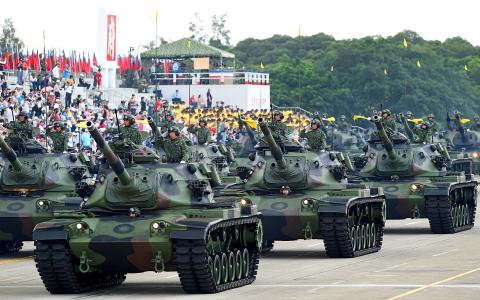The military is researching acquiring 120mm caliber guns for its fleet of M60-A3 Patton tanks amid claims that the current main guns — which are 105mm — are incapable of penetrating the armor of the T-96, the mainstay tank of China’s People’s Liberation Army (PLA).
According to a report by the Chinese-language Apple Daily, the military has 1,200 tanks — a mix of Pattons and the M48H tanks developed by General Dynamics and Army Armored Vehicle Development Center— all of which are armed with 105mm main guns.
The Ministry of National Defense is looking to launch a joint research project with the Army Command Headquarters and the Chung Shan Institute of Science and Technology to develop 120mm guns, which the Apple Daily claimed are capable of penetrating armor up to 700mm thick.

Photo: Chien Jung-fong, Taipei Times
The ministry is also mulling the possibility of purchasing second-hand M1A1 Abrams tanks from the US to upgrade its aging tanks.
Editor-in-chief of Asia-Pacific Defense Magazine Kevin Cheng (鄭繼文) said the ministry must ensure its aware of the pros and cons of conducting its own research.
If successful, the move would increase the capability of the nation’s tanks, as well as putting Taiwan on the road to perhaps building its own tanks, Cheng said, adding that the research nevertheless runs the risk of failing and it carries a hefty price tag.
Should the ministry purchase second-hand M1A1 Abrams tanks, it would increase the capability of the armed forces, while removing the risks associated with the ministry conducting its own research, Cheng said.
While the ministry has considered listing the M1A2 Abrams tanks as an item it would like to purchase, US military observers of the Han Kuang exercises said that the M1A2 might not perform to its full capacity due to Taiwan’s geography and the nature of its enemy.
The ministry has therefore turned to upgrading its existing Patton tanks and it might even consider manufacturing its own tanks in Taiwan, officials said.

The Coast Guard Administration (CGA) and Chunghwa Telecom yesterday confirmed that an international undersea cable near Keelung Harbor had been cut by a Chinese ship, the Shunxin-39, a freighter registered in Cameroon. Chunghwa Telecom said the cable had its own backup equipment, and the incident would not affect telecommunications within Taiwan. The CGA said it dispatched a ship under its first fleet after receiving word of the incident and located the Shunxin-39 7 nautical miles (13km) north of Yehliu (野柳) at about 4:40pm on Friday. The CGA demanded that the Shunxin-39 return to seas closer to Keelung Harbor for investigation over the

National Kaohsiung University of Science and Technology (NKUST) yesterday promised it would increase oversight of use of Chinese in course materials, following a social media outcry over instances of simplified Chinese characters being used, including in a final exam. People on Threads wrote that simplified Chinese characters were used on a final exam and in a textbook for a translation course at the university, while the business card of a professor bore the words: “Taiwan Province, China.” Photographs of the exam, the textbook and the business card were posted with the comments. NKUST said that other members of the faculty did not see

The Taipei City Government yesterday said contractors organizing its New Year’s Eve celebrations would be held responsible after a jumbo screen played a Beijing-ran television channel near the event’s end. An image showing China Central Television (CCTV) Channel 3 being displayed was posted on the social media platform Threads, sparking an outcry on the Internet over Beijing’s alleged political infiltration of the municipal government. A Taipei Department of Information and Tourism spokesman said event workers had made a “grave mistake” and that the Television Broadcasts Satellite (TVBS) group had the contract to operate the screens. The city would apply contractual penalties on TVBS

A new board game set against the backdrop of armed conflict around Taiwan is to be released next month, amid renewed threats from Beijing, inviting players to participate in an imaginary Chinese invasion 20 years from now. China has ramped up military activity close to Taiwan in the past few years, including massing naval forces around the nation. The game, titled 2045, tasks players with navigating the troubles of war using colorful action cards and role-playing as characters involved in operations 10 days before a fictional Chinese invasion of Taiwan. That includes members of the armed forces, Chinese sleeper agents and pro-China politicians